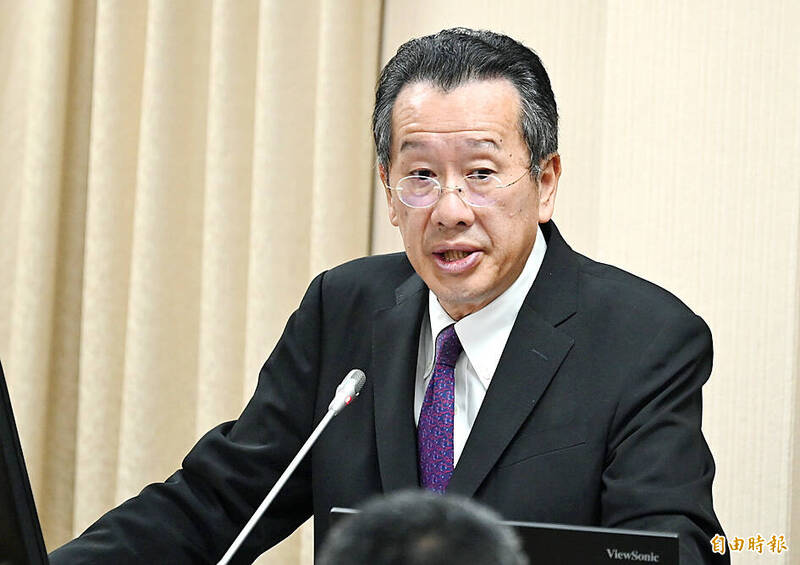《TAIPEI TIMES》 Next-generation fighter jets to be procured from US

Minister of National Defense Wellington Koo speaks at a meeting of the Foreign Affairs and National Defense Committee at the legislature in Taipei yesterday. Photo: Wang Yi-sung, Taipei Times
US SCANDAL:Wellington Koo also briefed lawmakers about RTX being found to have engaged in price gouging, saying that Taiwan was among the buyers affected
By Huang Ching-hsuan and Shelley Shan / Staff reporters, with CNA
The Ministry of National Defense is to procure next-generation fighter jets from overseas rather than developing them by itself, as certain key technologies have yet to reach maturity, Minister of National Defense Wellington Koo (顧立雄) said yesterday at a meeting of the legislature’s Foreign Affairs and National Defense Committee.
During her term as president, former president Tsai Ing-wen (蔡英文) had supported the plan of the ministry and the Chungshan Institute of Science and Technology for the nation to build next-generation fighter jets by itself, but Koo plans to procure them from the US instead.
“Two issues must be resolved when it comes to matters related to next-generation fighter jets. We must have maturely developed key technologies that are essential to the building of fighter jets. Another matter is that we must be able to procure from other countries essential equipment needed to build a fighter jet,” he said. “We can only move forward when the two conditions are met, but certain key technologies have yet to mature.”
Defense officials also told lawmakers that deliveries of three arm sales packages remain delayed, including TOW-2B anti-tank missiles, AGM-154 Joint Standoff Weapons and F-16V block 70 jets.
TOW-2B missiles have passed testing and should be delivered before the end of this year, they said.
“We have asked the US to deliver the first F-16V Block 70 jet in the fourth quarter this year. The remaining 65 fighter jets should be delivered by 2026,” Koo said.
Following a negotiation with the US, the first batch of AGM-15 glide bombs would not be delivered until the end of 2026, Koo said.
“It is the latest model, and it takes a longer time to build because the contractor would need to integrate different systems and prepare the materials required for the assembly line,” he said.
Koo also denied that the Chungshan Institute of Science and Technology would produce Stinger anti-aircraft missiles in Taiwan.
“There is no such thing. The capacity of Stingers cannot be sustained if there is limited demand. The manufacturer produces such missiles only in a few locations to meet demand in every country,” he said.
Koo also briefed lawmakers about RTX, formerly known as Raytheon Technologies, being found to have engaged in price gouging, saying that Taiwan was among the buyers affected.
He said Taiwan has asked the US to thoroughly probe all defense procurement deals involving defense contractor RTX to ensure there are no other similar overpricing issues.
Lawmakers across party lines asked the minister what Taiwan could do to prevent any reoccurrence.
Koo and a senior defense official in charge of foreign arms sales said that Taiwan does not have sufficient capability or experience to individually audit each arms sale and determine whether it is overpriced.
Koo said all that the ministry could do is to look into the prices other governments have previously paid when buying similar packages.
He added that Taiwan and the US are sealing arms sales based on the US Foreign Military Sales program, meaning Taiwan signed all such deals with the US government not an individual defense contractor.
Such government-to-government contracts mean that Washington is fully responsible for such deals, he added.
Koo said the US government was also a victim in the overpricing involving RTX.
Asked if the government is looking into all similar arms packages provided by RTX to make sure no irregularities are involved, Koo said Taipei has asked Washington to do so.
The ongoing investigation has so far found no Taiwanese involved in the price gouging, he added.
Bloomberg reported earlier this year that a US federal audit uncovered price gouging by defense contractor RTX in foreign military sales, resulting in significant losses for allied nations.
Following an investigation by the US Department of Justice, RTX reached a settlement with the US government, agreeing to pay US$1.24 billion in restitution and return profits gained from inflated prices to affected parties.
At the time, the nations impacted by the incident were unnamed.
However, it has since come to light that Taiwan was one of the affected buyers, having been overcharged by about US$250 million in two procurement deals: a radar system in 2013 and the Patriot missile system in 2017, which is a key component of Taiwan’s surface-to-air defense.
Taiwan has procured various military equipment from RTX over the years, which raises questions about whether there was other overcharging.
新聞來源:TAIPEI TIMES















